10 Best Platforms for Dropshipping, E-Commerce, and Print-on-Demand
Are you looking for the best platform for dropshipping? Well, we've got a list! Here are the best dropshipping websites compared and reviewed.
.avif)
%20(1).avif)
Online shopping has been growing steadily since the early 2000s, especially after the advent of the internet. Now we fast forward to 2025, and we can see that the dropshipping and e-commerce markets are booming.
According to the latest research, the top trending dropshipping products belong to niches like pet supplies, tech accessories, women's clothing and electronics. Competition is getting fierce, so it's important to choose the right platform for selling your dropshipping products.
The good news is that if you are looking for the best platform for dropshipping, we've done the heavy work for you. We've made a list of the best platforms for dropshipping and e-commerce. We list their pricing, features, what you can do with them, and so much more. Let's dive deep into them.
Best Platforms for Dropshipping and More in 2025
Here is the list of the best platforms for dropshipping in 2025:
1. Spocket

Spocket has always been number one as the best platform for dropshipping, especially when it comes to finding the best US and EU dropshipping suppliers. You can find over 100 million trending dropshipping products, and the platform has a winning catalog of over 20 million products as well. Spocket offers exclusive features like print-on-demand customization, branded invoicing, 24/7 VIP customer support and so much more. You can integrate it with major e-commerce platforms like Wix, WooCommerce, and Amazon. You can also import products with one click and enjoy automated order processing.
Spocket offers a 7-day free trial for new users and their pricing plans are very affordable. You can start out with their $39 a month plan. If you are subscribing to any of their annual plans, you can get up to 8 months off, which is pretty cool. Spocket is best known for its fast shipping times and will keep your customers happy. It's a must-have tool for any serious dropshipper. Spocket also offers no MOQs and supports placing bulk orders.
2. Alidrop
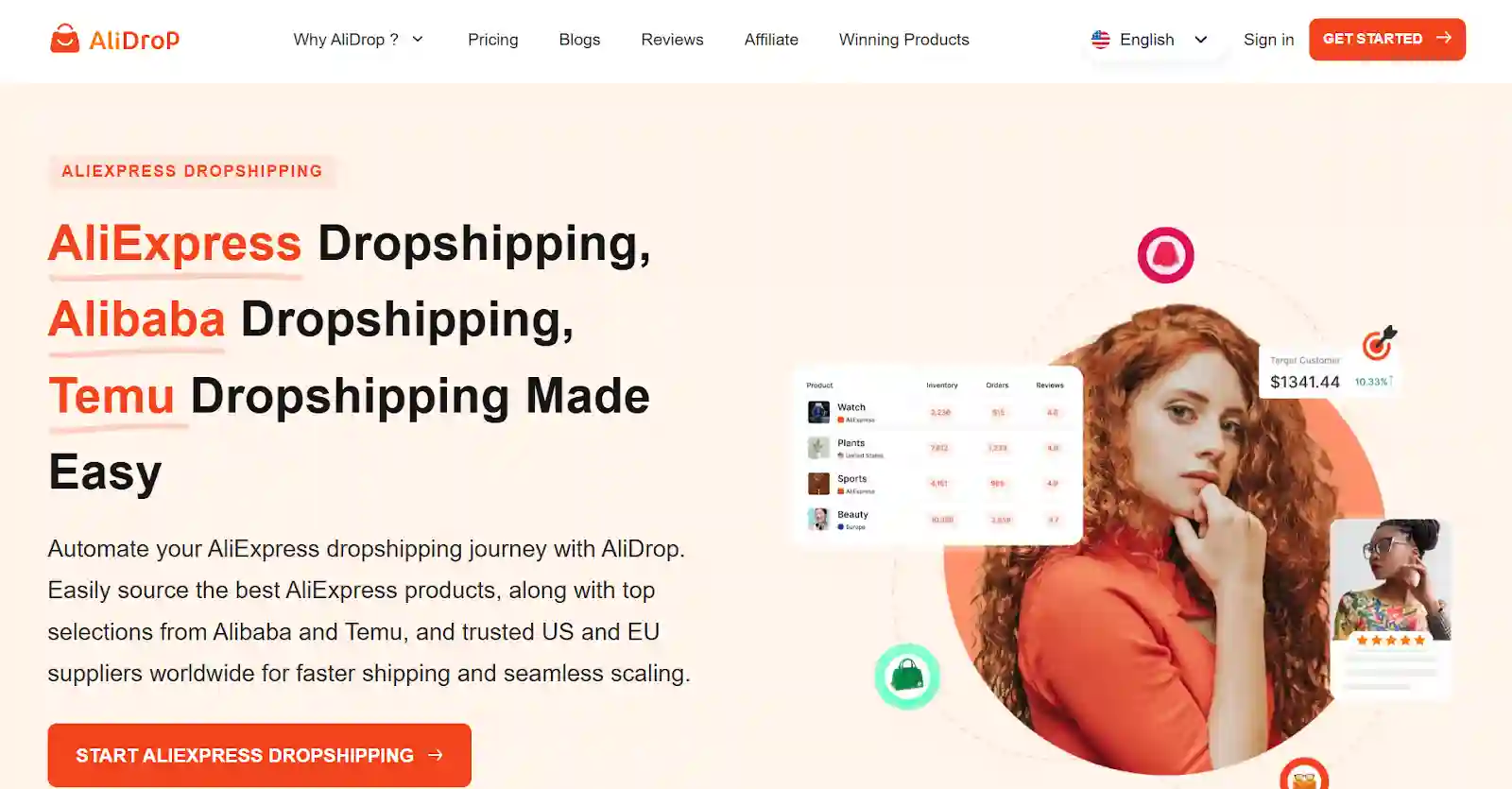
Alidrop is another best platform for dropshipping. It's been on our list for quite some time because of how good it is in AliExpress, Alibaba and Temu dropshipping. You can automate your entire AliExpress dropshipping journey with Alidrop. It helps you easily source the best AliExpress products and has trusted US and EU suppliers worldwide.
AliDrop also offers fast shipping and seamless scaling and it is backed by 100M+ monitored products. You can add products instantly with one-click product import feature and it is perfect for optimizing your AliExpress dropshipping business. Alidrop integrates with Shopify, eBay, Amazon and AliExpress. You can try out its seven day free trial to get started. AliDrop has various monthly pricing plans and its cheapest plan is the starter plan which costs $39 a month.
You can get up to 8 months off with its yearly subscription and its most expensive plan is the Unicorn plan which offers 25,000 unique products, 25,000 premium products, a product analyzer, and VIP chat support.
3. Shopify Magic

Shopify Magic brings AI automation right into your store admin. You can generate product descriptions, blog posts, and email campaigns without spending hours writing from scratch. The AI understands your brand voice and creates SEO-friendly content in seconds. Shopify Magic also includes an image editor that removes backgrounds and cleans up product photos. You'll save 15-20 hours per week on content tasks alone. The tool works across all Shopify plans at no extra cost, which makes it accessible whether you're just starting or already running a high-volume store.
Sidekick, Shopify's AI assistant, helps you run store operations through simple text commands. You can say "create a summer sale" and Sidekick will set up the discount, generate banners, and draft customer emails. It also provides sales forecasts based on past performance and current trends, so you know what to stock. Shopify Magic and Sidekick are free tools included with your Shopify subscription. You can automate product imports, optimize listings, and manage marketing campaigns all from one dashboard. If you need AI-powered store building and content generation in one place, Shopify Magic is a solid option for dropshipping.
4. Syncee
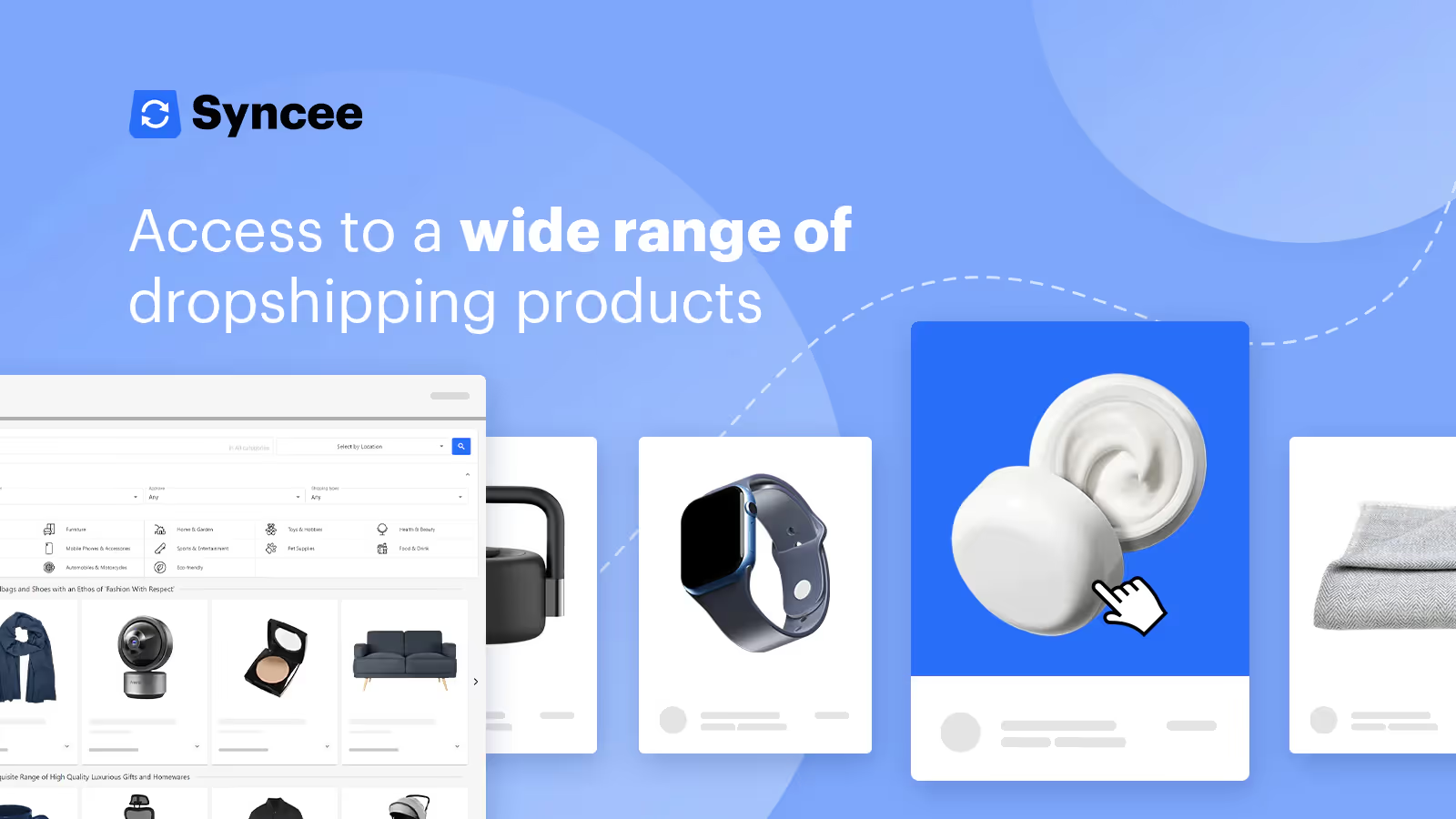
Syncee connects you with over 6 million dropshipping products from verified suppliers across the US, Canada, EU, UK, and Australia. You can filter suppliers by location, so if you need fast 2-5 day shipping from US or EU warehouses, Syncee makes it simple. The platform offers automated inventory updates twice daily and syncs order statuses in real time. You can access premium products that come from high-quality suppliers, and there's no minimum order quantity required. Syncee integrates with Shopify, WooCommerce, Wix, and BigCommerce, so you can manage multiple stores from one dashboard.
Syncee's pricing starts with a free plan that lets you browse products and create catalogs. If you want to import products to your store, the Basic plan is $40 per month for up to 25 products. The Pro plan costs $60 per month and gives you 250 products plus access to Premium and VIP product collections. You can create up to 20 catalogs to organize your inventory.
Syncee also provides dynamic pricing settings and lets you message suppliers directly. There's a 14-day free trial on paid plans, so you can test features before committing. Syncee is good for dropshippers who want a wide supplier network without bulk order requirements.
5. AutoDS

AutoDS automates your entire dropshipping workflow from product research to order fulfillment. You can search and import products from over 25 global suppliers including AliExpress, Amazon, Walmart, and Shein. The platform monitors stock levels and prices automatically, updating your store listings in real time. AutoDS places orders for you and syncs tracking numbers without manual work. You can import products in bulk with one click and set custom pricing rules to maintain your profit margins. The platform supports Shopify, eBay, Amazon, WooCommerce, Wix, Etsy, and TikTok Shop.
AutoDS offers a 14-day trial for $1, after which plans start at $26.90 per month. The platform includes an AI store builder that creates a ready-to-sell Shopify store with winning products already loaded. You can use AutoDS Academy for free courses and mentorship on product research and scaling strategies.
There's also a print-on-demand service and custom product sourcing through their warehouses. AutoDS provides 24/7 customer support and handles returns automatically. If you want end-to-end automation with AI-powered tools and access to multiple suppliers, AutoDS handles the heavy lifting while you focus on marketing and growth.
6. AI Dropship

AI Dropship uses artificial intelligence to identify trending products before they saturate the market. The platform analyzes millions of data points across marketplaces to surface winning products with high-profit potential. You can see real-time sales data, engagement scores, and market saturation metrics for each product. AI Dropship provides product recommendations tailored to your niche and preferred shipping regions. The tool supports sourcing from US and EU suppliers for faster delivery times, and you can set filters to find products with no minimum order requirements.
Pricing for AI Dropship typically starts around $29 to $59 per month depending on the feature set you need. You get access to automated product research, competitor analysis, and ad tracking across Facebook, TikTok, and Instagram. The platform generates ready-to-use ad creatives and provides targeting suggestions for your campaigns. AI Dropship also includes an image editor for customizing product photos and removing backgrounds.
You can integrate the platform with major e-commerce stores to streamline product imports. If you want AI-driven product discovery combined with market intelligence and fast supplier connections, AI Dropship removes the guesswork from product selection.
7. Zendrop
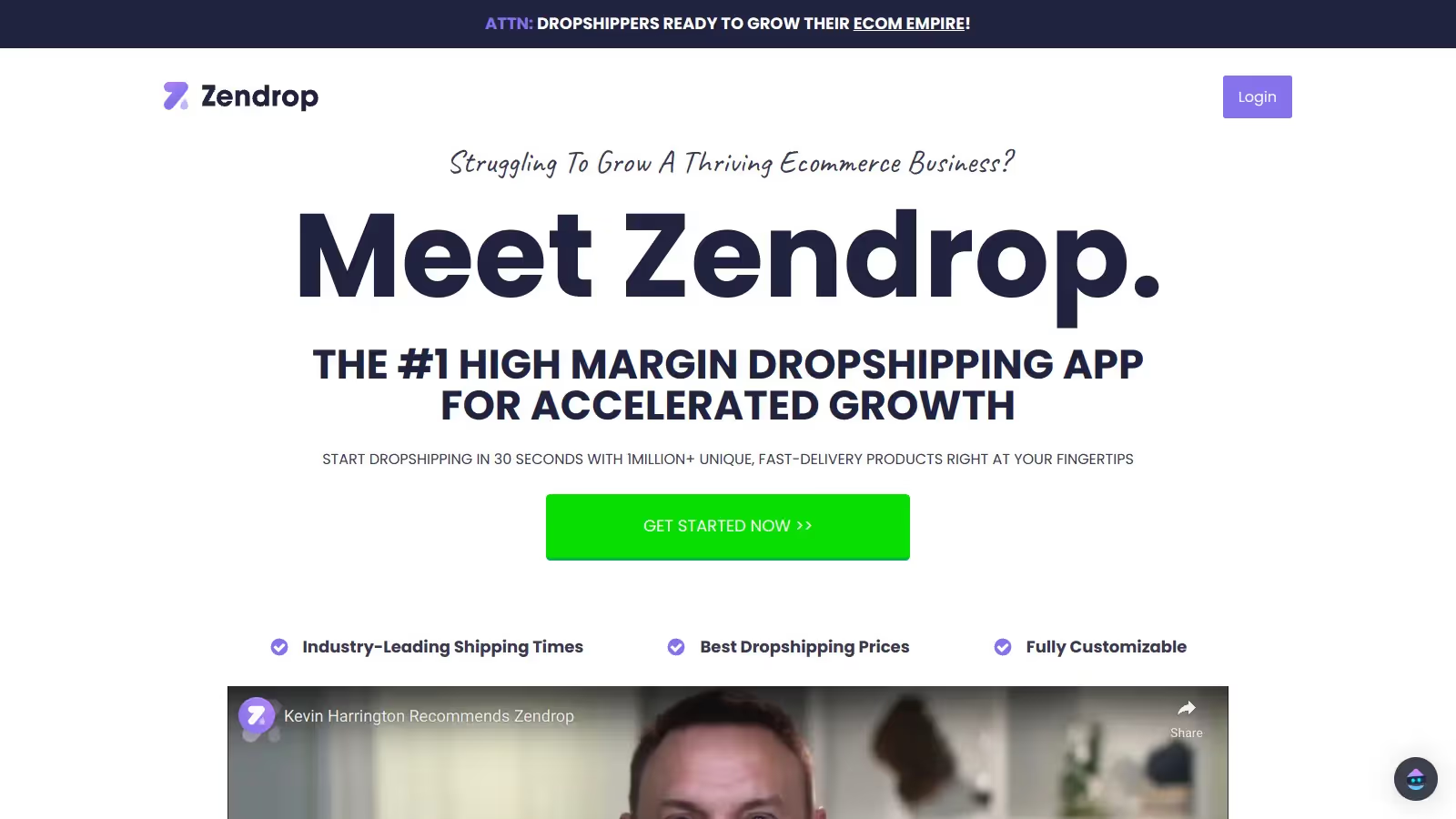
Zendrop specializes in custom branding and fast shipping for dropshippers who want to build a recognizable brand. The platform gives you access to US suppliers with 2-5 day shipping times and a large catalog of vetted products. Zendrop handles order fulfillment automatically and includes branded packaging options like custom thank-you cards, inserts, and logos on mailers. You can use print-on-demand features to sell customized items without holding inventory. Zendrop's Pro and Plus plans offer private labeling, which lets you sell products under your own brand name with custom packaging.
The free plan lets you import products and access basic fulfillment services. The Pro plan costs $49 per month and includes unlimited orders, faster shipping, and custom branding features. The Plus plan is $79 per month and adds Zendrop Academy training, subscription box capabilities, and a $100 monthly order credit.
If you're a high-volume seller, you can apply for the Private Agent program, which provides dedicated sourcing support and exclusive warehousing. Zendrop's no-MOQ policy means you can test products individually before scaling. If you want to create a professional unboxing experience and differentiate your brand with custom packaging, Zendrop provides the tools and supplier network to make it happen.
8. Trendsi
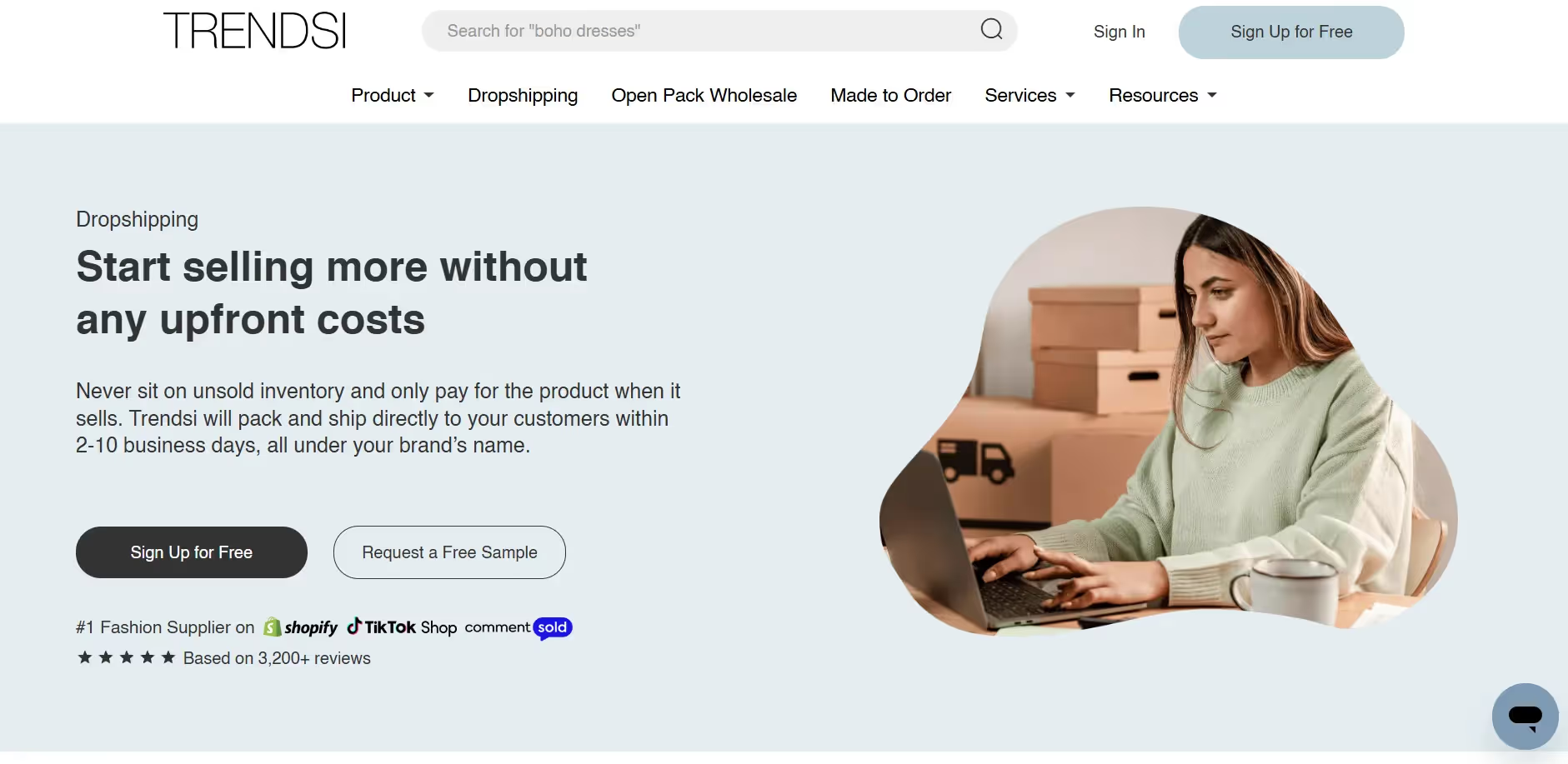
If you are looking for the best platform for dropshipping when it comes to elevating your fashion brand, then Trendsi would be it. You can request a free sample and sign up for free. You can dropship fashion products from trusted suppliers.
There's no monthly fees, no upfront inventory and Trendsy comes with order sync automation and real time smart inventory management. Trendsy stands out because of its 2-5 business days shipping. It also offers branded invoices from the US and up to 7 day free returns.
You can buy wholesale at factory costs. And TremCee also supports low MOQs. It will also help you sell on your favorite social media platforms and simplify sourcing, production, inventory and logistics. For fashion dropshippers, it takes care of your backend.
9. DSers

DSers simplifies AliExpress dropshipping by automating order processing and supplier management. You can place hundreds of orders in seconds with bulk order processing, which saves hours of manual work. The platform includes a Supplier Optimizer that finds the best suppliers based on ratings, shipping times, and costs. You can map product variants from multiple suppliers to a single listing in your store, giving customers more options without creating separate pages. DSers automatically syncs tracking numbers and order statuses to keep customers informed.
DSers integrates with Shopify, WooCommerce, and Wix, and you can manage multiple stores from one account. The platform offers customizable pricing rules that adjust product prices automatically based on cost changes or profit margins. You can create product bundles from different suppliers to increase average order value.
DSers provides real-time stock updates to prevent selling out-of-stock items. The pricing is flexible, with a free plan available for basic features and paid plans starting around $20 per month for advanced automation. If you're focused on AliExpress dropshipping and need powerful automation tools to scale your order volume, DSers handles the logistics so you can concentrate on marketing and customer acquisition.
10. Modalyst

Modalyst connects you with thousands of dropshipping suppliers in the US, Europe, and globally. The platform specializes in fashion, accessories, beauty products, and lifestyle items from independent brands and manufacturers. You can access millions of products including unique handmade items and luxury labels. Modalyst offers automated inventory updates and real-time order syncing, so your store always reflects current stock levels. You can import products with one click and customize pricing with fixed or percentage-based profit margins. The platform integrates seamlessly with Shopify, WooCommerce, BigCommerce, and Wix.
Modalyst's free Hobby plan lets you browse products and add a limited number to your store. The Startup plan costs $35 per month and gives you access to more product imports and faster shipping options. The Pro plan is $90 per month and unlocks Premium supplier access plus the AliExpress Booster Program with millions of additional products.
Modalyst emphasizes US suppliers with 5-8 day domestic shipping, which improves customer satisfaction. You can communicate directly with suppliers through the platform to negotiate terms or ask questions. If you want to sell branded or luxury products with fast US and EU shipping, Modalyst provides the supplier network and automation tools to run a professional dropshipping store.
How to Choose the Best Platform for Dropshipping?
Picking the right dropshipping platform depends on your business goals, budget, and the level of automation you need. Start by thinking about your target market and shipping requirements. If your customers are in the US or EU, prioritize platforms that connect you with local suppliers for faster delivery times.
When choosing a platform, evaluate these key factors:
- Supplier network and shipping speed. Check if the platform has US and EU suppliers for faster delivery. Read supplier reviews and verify shipping times before committing. Platforms with global warehouses give you more flexibility to serve different markets.
- Product catalog size and quality. Some platforms offer millions of products, while others focus on curated collections. Decide whether you want a wide selection or hand-picked items from premium suppliers. Look for platforms that include product quality scores and supplier ratings.
- Automation and integration options. Make sure the platform integrates with your e-commerce store. Automation features like bulk imports, automatic price updates, and order tracking sync save time as you scale. Platforms with AI-powered tools can help you optimize listings and find trending products faster.
- Pricing and trial periods. Compare monthly costs and see if there's a free plan or trial period. Test the platform's features before paying for a full subscription. Some platforms offer tiered pricing based on the number of products you import or orders you process.
- Custom branding and print-on-demand. If you want to build a brand, choose platforms that support custom packaging, branded invoices, and print-on-demand services. Zendrop and Modalyst offer private labeling and custom branding options that let you create a unique unboxing experience.
- Beginner resources and support. Platforms with free courses, tutorials, and 24/7 customer support make it easier to learn dropshipping. Spocket Academy, AutoDS Academy, Zendrop Academy, and Shopify Learn provide step-by-step guides, product research training, and marketing strategies. Access to coaching or mentorship programs helps you avoid common mistakes and scale faster.
Conclusion
Choosing the best platform for dropshipping comes down to your needs, budget, and growth plans. Focus on platforms that connect you with reliable suppliers, offer fast shipping, and provide automation tools to save time. Test different platforms using free trials to see which one fits your workflow best. Build your brand with custom packaging and quality products, and use AI tools to stay ahead of trends.
Best Platform for Dropshipping FAQs
What is the best platform for dropshipping in 2025?
The best platform depends on your goals. Spocket works well if you need US and EU suppliers with fast shipping. Shopify Magic is great for AI-powered store building and content creation. AutoDS offers full automation across multiple suppliers. Syncee provides a large supplier network with flexible pricing. Pick the platform that matches your niche, budget, and automation needs.
Do I need a minimum order quantity to start dropshipping?
No, most dropshipping platforms like Spocket, Syncee, and Modalyst offer suppliers with no minimum order quantities. This means you can order one item at a time to test products before scaling. No-MOQ suppliers reduce financial risk and let you experiment with different niches without large upfront investments or inventory commitments.
How do I find US and EU suppliers for faster shipping?
Platforms like Spocket, Modalyst, and Zendrop specialize in US and EU suppliers. You can filter suppliers by location to prioritize warehouses in these regions. Spocket reports that 80% of its suppliers are based in the US and EU, offering 2-5 day shipping. Fast local shipping improves customer satisfaction and reduces refund rates.
Can I use print-on-demand with dropshipping platforms?
Yes, platforms like Zendrop, AutoDS, and Spocket include print-on-demand services. You can create custom designs for t-shirts, mugs, and other products without holding inventory. POD providers print and ship items only when customers order. This model lets you test designs, offer personalized products, and build a unique brand without upfront production costs.
What automation features should I look for in a dropshipping platform?
Look for bulk order processing, automatic inventory updates, real-time tracking sync, and AI-powered product research. Platforms like AutoDS and DSers automate order fulfillment and price adjustments. Shopify Magic uses AI to generate product descriptions and marketing content. Automation reduces manual work and lets you scale faster without hiring extra help or spending hours on repetitive tasks.
Are there free resources to learn dropshipping for beginners?
Yes, many platforms offer free courses and tutorials. AutoDS Academy provides step-by-step guides on product research and scaling strategies. Zendrop Academy includes training on branding and marketing. Shopify Learn offers free videos and articles on store setup and SEO. YouTube channels like The Ecom King also provide free dropshipping tutorials. These resources help beginners avoid mistakes and build profitable stores.
Launch your dropshipping business now!
Start free trialRelated blogs
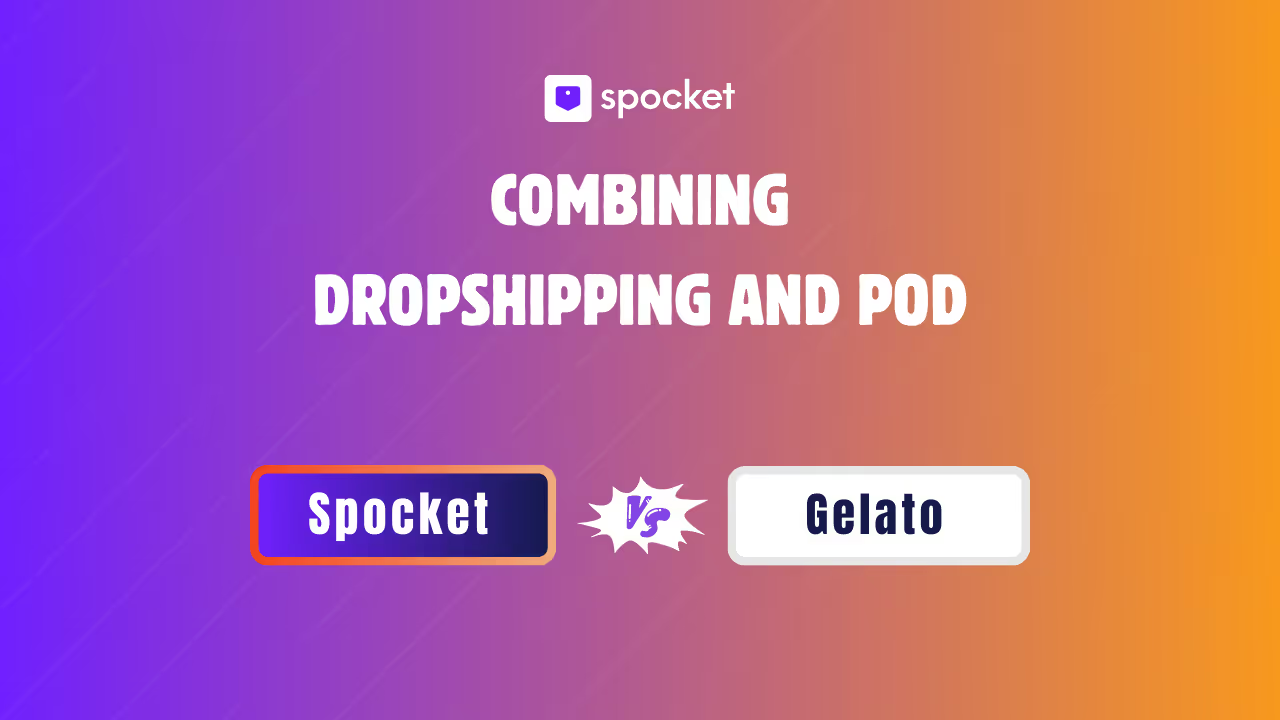
Spocket vs Gelato : Combining Dropshipping and POD
Compare Spocket vs Gelato for combining dropshipping and print on demand. Learn key differences, best use cases, and how to run both models together.

How to Create and Sell Digital Planners on Etsy for Passive Income
Learn how to sell digital planners on Etsy step-by-step. Create, list, price, and scale digital planners for passive income even as a beginner.

How to Use User-Generated Content (UGC) to Explode Your Sales
Learn how to use UGC for ecommerce to boost trust, conversions, and repeat sales with scripts, workflows, rights, and placement tips.


































